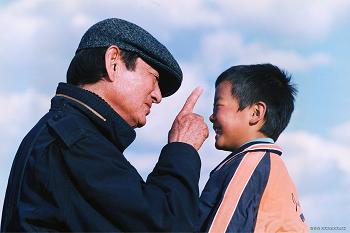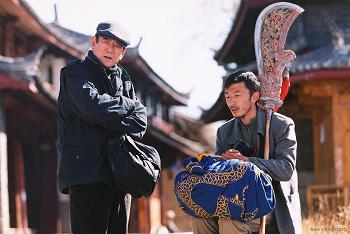

Acclaimed Chinese director Zhang Yimou is now settling into a groove, switching easily between glorious martial arts extravaganzas like House of Flying Daggers and Hero, to smaller, more intimate films like Happy Times, The Road Home, and Not One Less. Riding Alone for Thousands of Miles fits comfortably in the latter category, and shows a wry sense of humor that hasn't been seen before in Zhang's films. Riding Alone for Thousands of Miles deals with the relationships between father and son. Or, more specifically, between two fathers and two sons. The title is also symbolic for the journey that one father must take in order to reconcile with his son. Takada (Takakura Ken, The Firefly, Railroad Man) learns that his son is dying from cancer. They have been estranged for a decade, and his son still refuses to see him.
His daughter-in-law Rie (Terajima Shinobu, Tokyo Tower, Get Up!) gives him a tape that his son made. On it, Takada's son visited rural China to interview some Chinese opera performers in the rural Yunnan province. He promises to return one year later in order to film Li Jiamin, the local performer, in Riding Alone for Thousands of Miles, a story from the Chinese epic The Romance of the Three Kingdoms. Takada sees this as an opportunity to reconcile with his son, and begins the long journey to Yunnan. But Riding Alone is not just about the destination. Zhang, who co-wrote the screenplay with Zou Jingzhi, wants to show how this journey changes Takada, as well as the people around him. Takada arrives in the village only to find that Li is in jail. He will not film Riding Alone without Li performing. He passes through many hurdles in order to get permission to film in jail, only to find that Li will not perform.
Li is depressed, because he recently discovered he has a son. Li is heartbroken because he has never seen his son. Takada decides that he will travel to the rural village where Li's son is and reunite son and father. Takada can clearly relate to the anxiety and sadness that Li is feeling, and sees this new task as a way to atone for the unnamed past indiscretion that caused their estrangement. Of course, once he finds Li's son, things change again. Takada sees a new opportunity to become a good father, albeit temporarily. He will be there for Li's son, unlike the way he was not for his own. It's all a bit sappy, but Zhang manages to keep things emotional without approaching the point of cheesy.
Most of this is due to a strong performance by Takakura, who is extremely popular in Japan. Takakura has the look of somebody who has been through much. His character doesn't talk much, looks gruff most of the time, and he has these huge wrinkles in his face that look like they were carved there. Most of the time, he walks around in a hat that makes him look even older. Takakura is completely isolated in China. He doesn't speak the language, and for the most part, is saddled with an inept interpreter (who sometimes, amusingly, lapses into English). It makes him feel extremely lonely, and causes him to think more about the separation from his son. Much of what he ponders comes through in stark narration, so that the viewer can feel what he is feeling. Takada is the stereotypical emotionless Japanese man, and he plays the part well. So the few times where he does lose it, things are all the more heartbreaking.